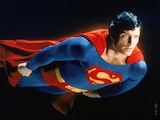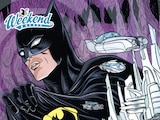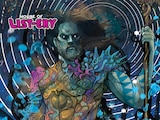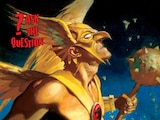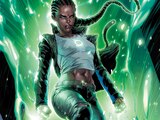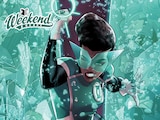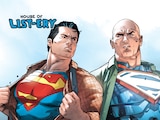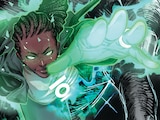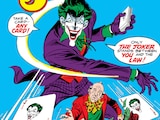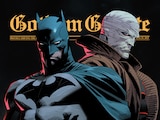The return of Arthur Curry in Aquaman and the Lost Kingdom also means the return of his all -time biggest hater, Black Manta. We all know this guy cannot stand Aquaman’s fish guts. But is a five-fathom grudge all there really is to the man? What else does he have going on in his own life? If you’d like to know the man behind the mask, then the book for you is Chuck Brown, Valentine De Landro and Matthew Dow Smith’s Black Manta.
The Premise:

David Hyde is dying. At least, that’s how he feels. Ever since dredging up a large nugget of orichalcum (recognize that name?), an ancient Atlantean ore with unknown properties, Black Manta has been experiencing aneurysms of increasing intensity. Not knowing why or how they keep coming, the ocean’s most notorious modern pirate is left wondering what legacy he’ll leave behind to the world and to his son. Once he’s gone, will people only remember Black Manta as Aquaman’s sworn enemy?
Once, David had different ambitions. Dreams and desires of his own, undefined by his personal grudge against an undersea king. Now, as he nears the end of his life, is it too late for him to re-examine what he lives for? Aided by his second-in-command Gallous the Goat, Black Manta seeks to avoid his untimely demise by discovering the nature of his connection to the orichalcum, and perhaps a new self-definition.
Let’s Talk Talent:

The Eisner and Ringo Award-winning Chuck Brown is perhaps best known for his independent comic Bitter Root, a supernatural epic set over a backdrop of the 1920s Harlem Renaissance. Brown brings that same eye for melding the fantastic with Black culture in Black Manta, exploring a secret history to Black Manta’s own people and examining a cause he once believed in—reinventing Atlantis as a Black paradise. It’s the first chapter in a saga Brown is still writing, continuing from here to Aquamen, and most recently Titans: Beast World: Waller Rising.
Art on Black Manta is split between Valentine De Landro and Matthew Dow Smith, each of whom present thrilling action sequences that make Black Manta appear truly formidable in the face of each threat he must conquer to preserve his life and legacy. Consistently, their art conveys Black Manta’s self-pride and determination as worthy not of scorn or disdain, but of respect.
A Few Reasons to Read:

- Blackness in a Super-World: Since Aquaman’s nemesis first removed his helmet in 1977’s Adventure Comics #452, the story of Black Manta has been the story of a Black man. Seeking Atlantis as refuge for a people mistreated and marginalized, David took to the sea when no place on land seemed safe for a Black man to get by. In this miniseries, Chuck Brown reconnects Manta to those original roots, presenting a united world of Black heroes and metahumans each with their own perspectives on life in a world more fantastic than our own, but which still holds many of the same prejudices.
- With Special Guests: Some delightful familiar faces await you in Black Manta, employed to surprising effect. Nubia, Queen of the Amazons, Gentleman Ghost, Doctor Mist, the mostly forgotten Aquaman villain Captain Demo, and even Martian Manhunter enemy the Human Flame all get their moments in the sun as Black Manta battles with urgency towards a last shot at purpose.

- Specters of the Past: Historically, Black Manta’s “taking Atlantis” plan has always been a problematic one. Though he claims to stand for the salvation of his people, isn’t he just displacing another population in the process? In Black Manta, Brown cleverly grants new perspective on the situation with a longer view of history, the Oricalchum revealing that David Hyde has always had an ancestral connection to Atlantis. Is it colonization, or is it just coming home?
- Facing the Pretender: Of all the guest stars featured in Black Manta, the most thrilling to us personally was the rise of Devil Ray. Due to character clearance issues, Devil Ray was an original villain who stood in for Black Manta in the ’70s Super Friends and the 2000s Justice League Unlimited animated series. In Black Manta, David Hyde finally has the chance to confront his own stand-in, now granted a rich backstory for the first time as a former Black Manta idolizer turned henchman who never forgot Manta’s initial vision, even as his hero fell further into personal vendetta against Aquaman.
Why It’s Worth Your Time:

More than the Joker, Lex Luthor, or maybe even Reverse-Flash, few comic book villains are defined so much by their opposition to a specific hero as Black Manta. If you asked anyone before 2021, it would be quite difficult to imagine what a Black Manta story without Aquaman opposite him would even look like. But by examining the character’s historical motivations, the drive that’s kept him coming back to the sea long before he crossed harpoon against trident, the Black Manta team here discovers the man we’ve only ever known as villain. Will he ever be a good father? Probably not. A hero? Well, we’ll see where Waller takes him. If Black Manta teaches us anything, it’s that not just anybody can make that helmet look cool.
Black Manta by Chuck Brown, Valentine De Landro, Matthew Dow Smith and Marissa Louise is available in print as a trade paperback and can be read in full on DC UNIVERSE INFINITE.
Alex Jaffe is the author of our monthly "Ask the Question" column and writes about TV, movies, comics and superhero history for DC.com. Follow him on Bluesky at @AlexJaffe and find him in the DC Community as HubCityQuestion.
NOTE: The views and opinions expressed in this feature are solely those of Alex Jaffe and do not necessarily reflect those of DC or Warner Bros. Discovery, nor should they be read as confirmation or denial of future DC plans.


